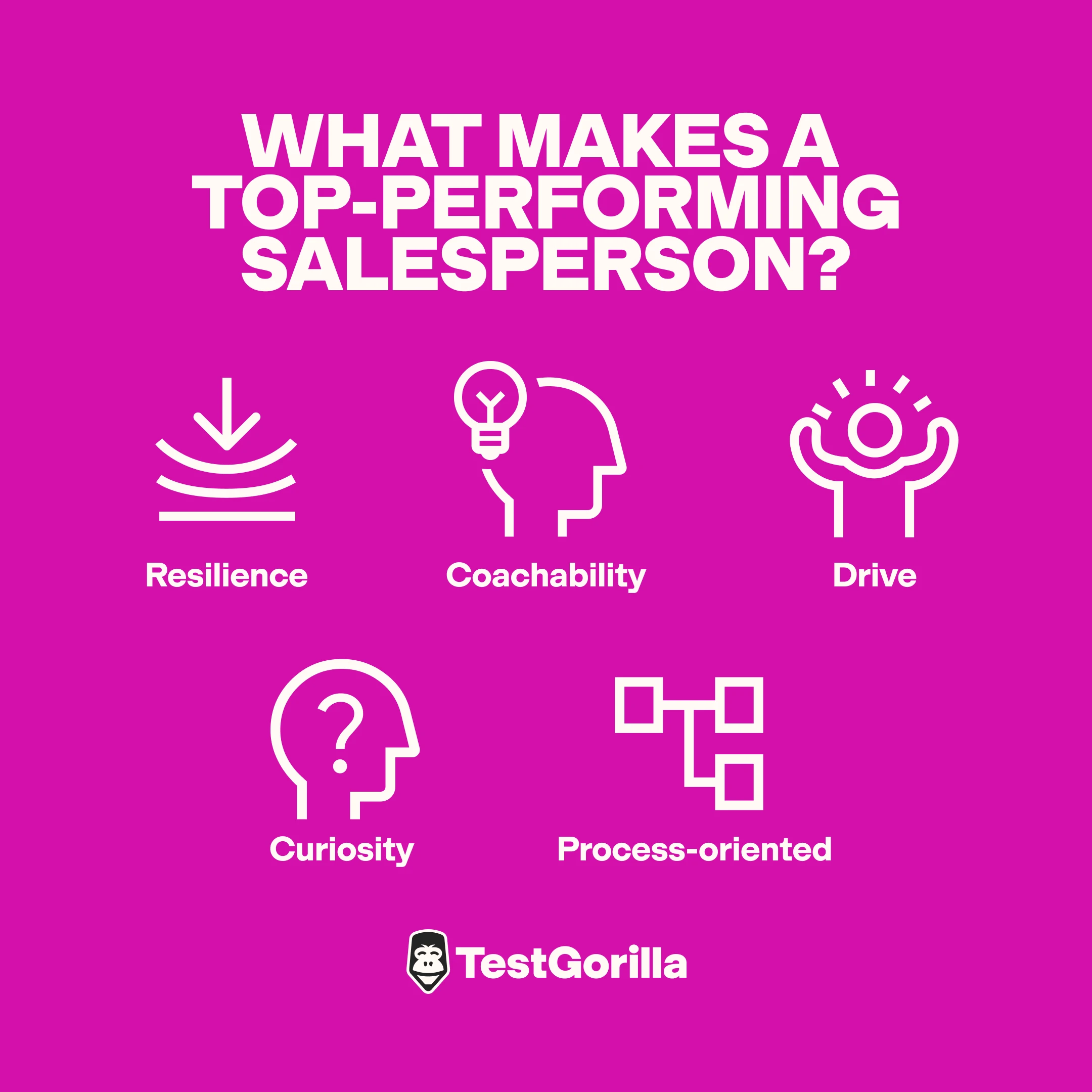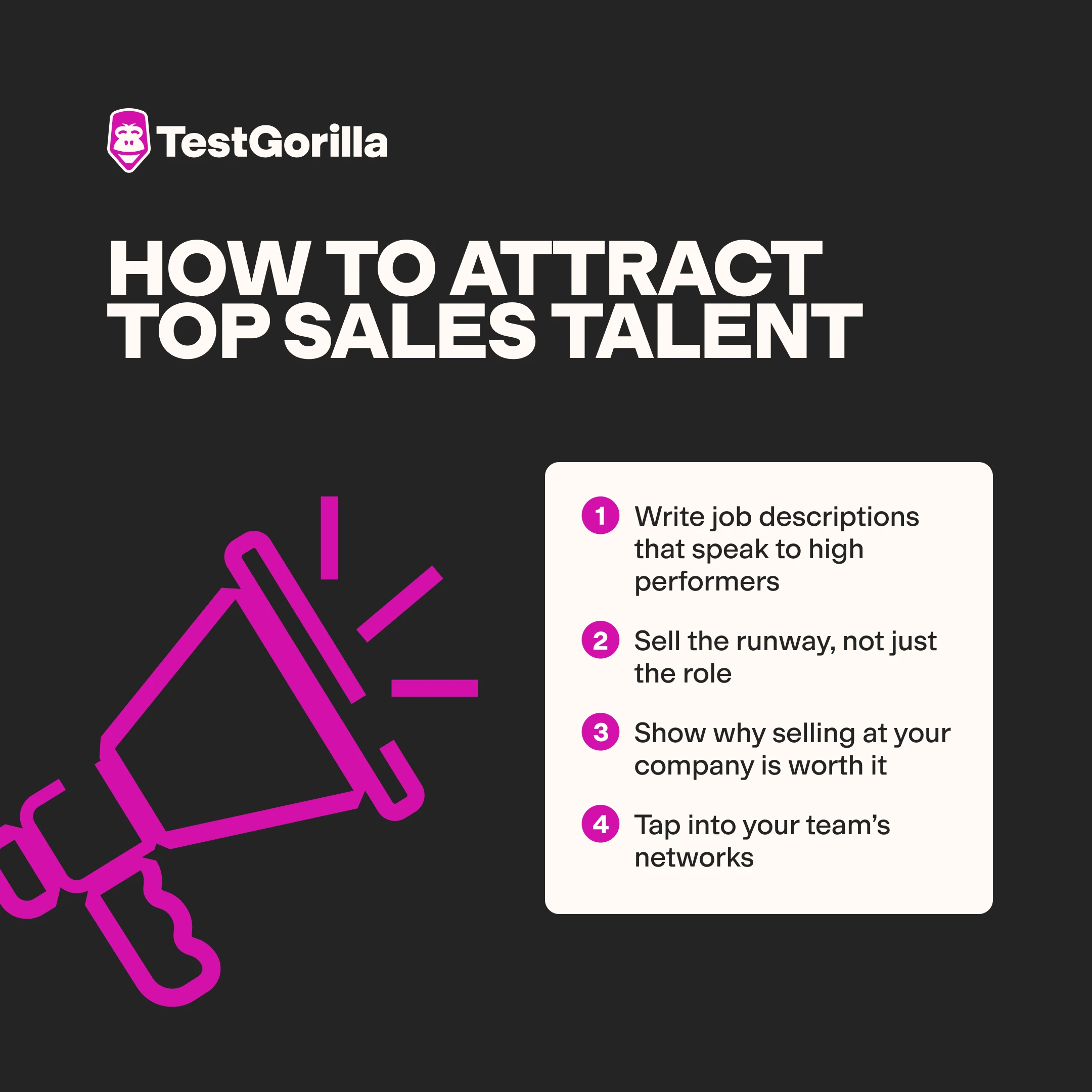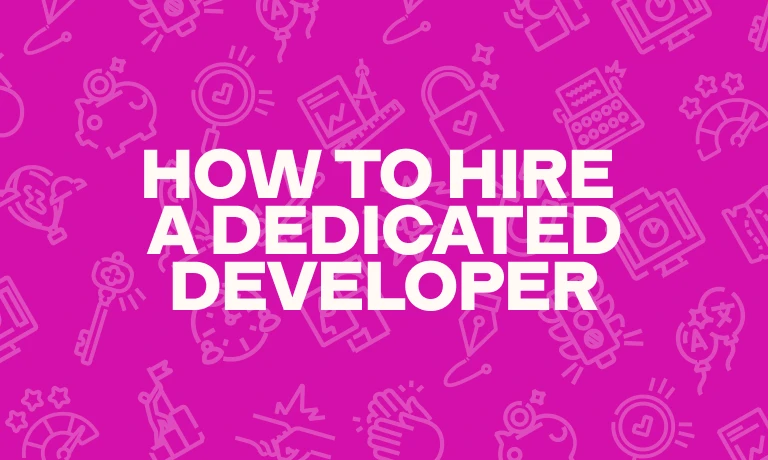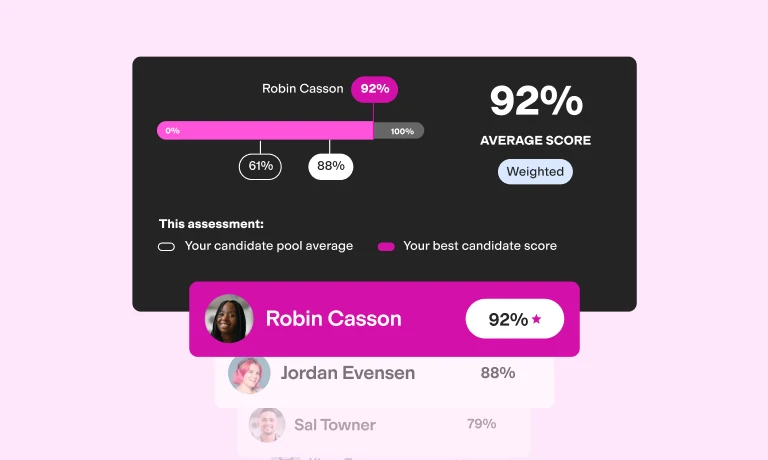Hiring great salespeople is more of a challenge than many recruiters realize. Too often, confident, smooth-talking candidates ace the interview but struggle once hired. They fumble deals, mishandle objectives, fail to build pipelines, and miss quota.
The issue? Traditional hiring practices don’t offer a clear picture of what a sales candidate can actually do.
Whether you’re scaling your team or replacing underperformers, you can’t rely on outdated practices or gut feel to find top sales performers. You need proven tactics to attract qualified candidates and objective tools (like TestGorilla’s Sales Aptitude test) to assess them. That way, you can see how they’ll perform on the job – before they’re on the job.
In this guide, we’ll explain how to attract, evaluate, and hire top sales talent who don’t just talk the talk, they walk the walk, too.
Table of contents
- What makes a top-performing salesperson?
- Why traditional sales hiring methods fall short
- How to attract top sales talent
- The right way to evaluate your sales candidates
- Red flags to watch for when interviewing sales candidates
- How to build a hiring process that attracts and closes top talent
- Hire your next sales superstar with TestGorilla
What makes a top-performing salesperson?
The best salespeople don’t talk a good game – they back it up with consistency, strategic thinking, and a mindset geared toward growth.
These are the sales reps, sales managers, and account executives who hit quota early, review their calls for improvement (without being asked), and always know where each deal stands in the pipeline – every single week.
Here’s what separates the best from the rest:
Resilience: They bounce back from rejection fast, not with empty bravado but with reflection, adjustment, and a willingness to try again. They know “no” doesn’t always mean “never.”
Coachability: They see feedback as fuel, not a threat. Strong professionals ask for input, implement it into their sales process, and show measurable improvement over time.
Drive: Top salespeople bring their own momentum. You won’t find them coasting or waiting for a pep talk – they treat sales like a craft, set a high bar for themselves, and strive to deliver results and smash goals.
Curiosity: Great salespeople don’t pitch first, they dig in. They ask layered, thoughtful questions to truly understand pain points, priorities, and blockers.
Process-oriented: They follow a structured approach – such as MEDDIC (Metrics, Economic Buyer, Decision Criteria, Decision Process, Identify Pain, and Champion) or SPIN (Situation, Problem, Implication, and Need-Payoff) – without sounding scripted. They stay organized, their pipeline is intentional, their follow-up is tight, and nothing slips through the cracks.
Why traditional sales hiring methods fall short
Most sales hiring processes are built to reward the wrong things.
Interviews often favor confidence and charisma over clarity and capability. Resumes can showcase sales experience but rarely reveal how an individual performed under pressure, closed complex deals, or established a solid sales pipeline.
And too frequently, decisions are made based on a candidate’s personality rather than their proven performance – because hiring teams lack a consistent, objective way to evaluate real sales ability.
That’s why so many “great in the room” candidates underperform in the role.
Brad Scharf, COO at Go Auto Insurance, learned this the hard way.
“One big mistake I’ve made in the past is hiring someone because they were really confident in the interview… But they didn’t do the work. It ended up costing us time and money,” he tells TestGorilla. “Now, I look for people who are consistent, not just charismatic.”
This gap between how someone sounds and how they perform is where most sales hiring goes wrong. If you don’t have a reliable way to assess behaviors like follow-through, adaptability, pattern recognition, and problem-solving, you’ll keep hiring reps who don’t deliver.
And the cost of these mis-hires isn’t just financial. Mis-hires can also weaken team morale, tarnish client relationships, and damage your business’s reputation.
The best insights on HR and recruitment, delivered to your inbox.
Biweekly updates. No spam. Unsubscribe any time.
How to attract top sales talent
You now know what a great sales performer looks like and why traditional hiring methods won’t help you land top talent. But how do you attract these ideal candidates?
Let’s break it down.
1. Write job descriptions that speak to high performers
Top-performing salespeople aren’t aimlessly browsing job boards or hoping for “a great culture” or “a fast-paced environment.” They’re selective and apply for positions that feel like a great fit and have a clear upside: a compelling product, a proven path to earnings, or a team that plays to win.
So, if your job descriptions are loaded with buzzwords and lacking specifics, you’ll turn away the candidates you want.
Your job description should answer the questions that top sellers are asking:
What are the quota expectations? Ambiguity around targets is a red flag. Share something specific, like “$800K ARR in year one.” It shows transparency and helps reps and managers plan to hit it.
What’s the territory? Defined accounts or geographic regions show candidates that your sales organization has real opportunities, not just a list of cold leads.
What tools and support systems are involved? Mention systems like a customer relationship management (CRM) platform to track deals, sales development representatives (SDRs) to book meetings, and enablement tools such as training and development materials, pitch decks, and objection-handling guides. These signal that your team is structured, well-supported, and serious about closing.
What’s the sales methodology? Note whether you use SPIN, MEDDIC, Sandler, or another methodology. Top reps and sales managers want to know they’re joining a team that values process, not just “winging it.”
What’s the sales cycle, deal size, and commission structure? Sharing these details upfront helps candidates understand what the day-to-day will look like and whether the earning potential aligns with their goals.
2. Sell the runway, not just the role
High performers aren’t just chasing commissions and aiming to close as many deals as possible – they’re investing in their careers. So, your sales job can’t sound like a grind with no endgame.
In every part of your hiring process, show the path forward. Be sure to cover:
Realistic earning potential over time: Don’t stop at base and commission. Share realistic on-target earnings (OTE) ranges and what top reps actually earn (e.g., “top 25% of reps earned $180K+ in 2024”).
Clear promotion paths: Offer timelines, not just titles – for example, “Most AEs move into senior roles or sales leadership within 18–24 months.” Bonus points if you point to successful sales team member journeys or internal mobility stats.
Development opportunities: Talk about what helps reps grow, whether it’s paid certifications, 1:1 coaching, weekly call reviews, or a learning stipend. These details show you’re serious about long-term growth.
3. Show why selling at your company is worth it
Top sales professionals won’t back a product they don’t believe in or join a team that looks unstable. In your job descriptions and interviews, give candidates real reasons to be confident by outlining:
Product-market fit: What problems does your product solve, and for whom? Share proof points like recent customer logos, case studies, or market share stats.
Sales and product alignment: Let candidates know how often you release new features and how feedback from the field shapes your roadmap. This shows you're not just listening, you’re acting.
Retention signals: Share your customer churn rate (the percentage of customers who leave over time), your NPS (Net Promoter Score, which measures customer satisfaction), or a few real quotes from recent reviews.
Team support: Don’t just say your culture is great – show it. Post a recent internal leaderboard, mention how you celebrate wins, or share an onboarding timeline to prove new reps aren’t thrown in cold.
4. Tap into your team’s networks
Your best sales hires may be one introduction away – so reach out to the highest-performing pros on your team for referrals.
But don’t simply ask, “Know anyone who’d be interested in this role?” Instead, try, “Who’s one person you’ve sold with before that you’d want on this team?”
Then, make it easy for your existing team members to follow through:
Build a fast referral flow: Create a short Google Form or add a /refer Slack shortcut so it’s a 30-second task, not a full write-up.
Clarify the ask: Share examples of the roles you’re hiring for, deal sizes, or industries that are a match, so your team knows exactly who to refer as potential hires.
Sweeten the deal: Offer a bonus that kicks in 90 days after a referral has been hired.
The right way to evaluate your sales candidates
Once you’ve attracted top sales talent, it’s time to identify the cream of the crop. Think of this stage like scouting a pro athlete: You’re not just looking for highlight reels – you want game footage, stats, and stories of how they triumphed or bounced back after defeat.
That’s where skills-based hiring comes in.
Start with talent assessments
These are evidence-based tools that allow you to screen candidates for real-world ability. Talent assessments for sales roles, in particular, simulate everyday selling challenges, giving you a clear picture of how candidates think, communicate, and perform under pressure. That means you won’t rely on guesswork – you’ll make hiring decisions rooted in actual skill.
TestGorilla is purpose-built for this. Our Sales Aptitude test helps you measure key sales competencies that matter across any sales role, including:
Prospecting
Lead qualification
Objection handling
Sales reasoning
Communication
To go even deeper, combine the Sales Aptitude test with up to four other tests relevant to your sales team’s needs.
For example, add a Communication Skills test to evaluate candidates’ clarity and influence, a cognitive ability test to assess problem-solving under time constraints, or TestGorilla’s Culture Add test to not only measure culture fit but also see how a candidate can contribute to your company’s long-term values and team dynamics.
Talent assessments are a core pillar of skills-based hiring, which removes bias, increases the quality of your hires, and helps future-proof your team. You can spot high-potential candidates you may have overlooked with traditional screening tools – and ensure you invest interview time only in people who’ve proven they can do the job.
Ask effective interview questions
The candidates who perform best on their talent assessments will move forward to the interview stage. No matter the position (sales rep vs. sales manager) or goal (high-volume inside sales vs. long-cycle enterprise deals) you’re hiring for, the goal of the interview is the same: to dig deeper into each candidate’s past to see how they perform on the job.
To achieve this, you need to ask questions that will give you insights into candidates’ performance, potential, and professionalism.
Performance data questions
Start with the basics:
What targets were you responsible for, and how did you perform against them (meet, exceed, etc.)?
What was your average sales cycle or time-to-close?
What kinds of deals or customer types did you typically work with in your previous position?
What’s your current lead-to-close rate?
Then, you can ask about lead conversion rates or touchpoints per deal if you’re hiring for an outbound-heavy sales role. Or, if you’re filling a relationship-based sales position, you can ask questions about deal expansions and upsells.
In any case, top performers will be able to share metrics without hesitation and take ownership of their performance.
Process questions
Next, have candidates walk you through their sales process:
Where do you tend to face friction in the sales cycle?
Where do deals you oversee tend to move fastest?
How do you navigate objections and other challenges during deals?
These questions reveal more about candidates’ problem-solving and recovery skills than you would from any rehearsed highlight reel.
Behavioral questions
Finally, layer in structured behavioral questions to assess soft skills like resilience, coachability, and accountability.
Tell me about a deal or opportunity that didn’t go as planned. What happened, and how did you handle it? What would you do differently now?
Describe a time you had to quickly learn something new to succeed in your role.
When was the last time you faced a major setback at work? How did you move forward?
Tell me about a time when you received tough feedback from a manager. How did you respond, and how did you adapt your approach to action that feedback?
Hiring for a technical sales role? Check out our sales engineer interview questions for role-specific prompts.
Use roleplays
At this point, you’ve seen how candidates perform on core sales skills, and you’ve had the chance to dig into their experience and mindset. Now, it’s time to see their sales talent in action – and roleplays are perfect for this.
Ask candidates to pitch a product, handle a difficult objection, or navigate a simulated customer conversation. Then, introduce a curveball – a pricing pushback, an unexpected ask, a sudden stall, a last-minute stakeholder - and observe how they respond and adapt.
You aren’t looking for perfection – you’re looking for signs of real sales judgment:
Do they listen actively and adapt their communication, or do they push through with a script?
Do they reframe explanations in the face of objections?
Can they stay calm, curious, and consultative under pressure?
Can they think on their feet, or do they hesitate in high-stress situations?
These are the characteristics that rarely appear on resumes and can sometimes slip through the cracks in interviews.
Red flags to watch for when interviewing sales candidates
During interviews, keep an eye out for these signs that a candidate may not be the real deal:
Inconsistent metrics: They talk about big wins but can’t explain how they got there or haven’t hit quota more than once.
Overreliance on personality: Confidence is great, but if they lean too hard on charm and avoid specifics, they may not have the track record to back it up.
The blame game: If every missed target was someone else’s fault (bad leads, bad product, bad timing), the candidate might not take ownership when it counts.
Vague storytelling: Ask about deals or potential customers they lost and what they learned. If the answer is generic or sidesteps details, they may not have the process or self-awareness that top reps rely on.
How to build a hiring process that attracts and closes top talent
Top reps are decisive. If your hiring process is slow, vague, or disorganized, they’ll move on before you’ve made an offer.
Here’s how to build a process that respects their time (and yours):
Set the pace early: Sales hiring isn’t the place for drawn-out timelines. Aim to move from application to offer in 2–3 weeks. Communicate timelines clearly up front so qualified candidates know what to expect.
Use a structured funnel: Keep your process tight: talent assessment → structured interview → live task → offer. Each step should build on the last, not repeat it.
Give fast, clear feedback: After each stage, let your candidates know where they stand. A short email or call goes a long way toward showing you’re serious.
Sell throughout: Don’t wait until the offer stage to talk growth and earnings. Mention the OTE, career path, and company culture at every step so candidates stay engaged and see long-term value in the role well before compensation discussions begin.
Hire your next sales superstar with TestGorilla
The best sales hires aren’t always the flashiest talkers. They’re the ones who build pipelines, hit targets, and stay calm when the pressure’s on.
To find them, you need a hiring process that uncovers how candidates think, sell, and follow through.
That starts with using talent assessments, such as TestGorilla’s Sales Aptitude test and role-specific assessments, to surface sales skills that really matter: prospecting ability, objection handling, deal discipline, sales reasoning, and more.
When you combine those insights with structured interviews that ask the right questions, you won’t simply add another person to your headcount – you’ll create a team that performs.
Ready to find your next sales superstar? Book a TestGorilla demo today.
You've scrolled this far
Why not try TestGorilla for free, and see what happens when you put skills first.




















